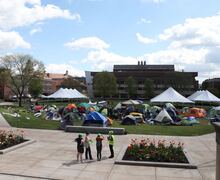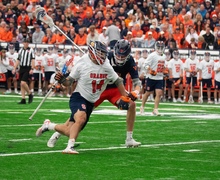Middle ground
On a muggy, mid-summer afternoon in August, a group of mild-mannered students wove through the busy streets of Syracuse University and swept into the campus Starbucks. As they made their way to the patio to join friends, the smells of oven-baked pastries and freshly brewed coffee gave way to pricey colognes and cigarette smoke.
On the patio, the young men all embraced fondly, roared with deafening laughter and greeted each other with ‘Assalamu alaikum,’ the standard Muslim greeting that means ‘Peace be upon you.’ They sat, anchored to the black plastic chairs, puffing Marlboro Mediums and talking until afternoon turned to dusk.
These students, most of them from the Middle East, gathered that day to catch up and discuss their experience as international students. The college life at SU had brought many challenges that none of them ever imagined. And for some of these young international students, the treacherous weather and the drudgery were only part of the difficulty.
A New Wave of Muslim Students
There have been a diminishing number of Middle Eastern enrollments since the media had vastly reported Sept. 11. The Institute of International Education published a report online in 2004 that showed a 10 percent decline in the enrollment of Middle Eastern students in U.S. colleges. In 2004 alone, student numbers from both Saudi Arabia and Kuwait were down 25 percent from the year before.
Since then, the U.S. has boosted efforts to bring over Middle Eastern students, and as a result, enrollments from the Middle East increased by 25 percent in 2006-2007, according to the Web site Open Doors 2007. The most notable increase was in the number of students from Saudi Arabia. In fact, the total number of Saudi Arabian students attending U.S. schools – 7,886 – is the result of a large Saudi Arabian government scholarship program launched in 2005.
While it was not even ranked in the top 25 institutions hosting international students in 2006-2007, SU has been a model of diversity and acceptance since Sept. 11.
Fariba Rahmanzadeh, an international student advisor at the Slutzker Center for International Services, said SU saw the aftermath of Sept. 11 as an opportunity to increase mutual understanding and develop an even stronger bilateral relationship between American students and Middle Eastern students. Rahmanzadeh said the effort by the university to raise awareness about religious diversity is the cause for the new influx of Muslim and Arab students on campus today.
Assimilation as an Islamic Duty at SU
Two years have passed since Ahmed Alakeel left behind the vast and safe comfort of his parents’ home in Jubail, a prosperous city nestled in the open spaces of the Persian Gulf coast of Saudi Arabia, for a cramped, drafty studio on the crowded and cold SU campus. Alakeel, a freshman information studies major, had heard stories about Saudi students’ hardships on U.S. campuses, but the word was that SU was just a different place. A good place for Saudis, he said. Now, he looks at home in a crew-neck T-shirt and slacks.
At 18, Abdulmohsen Alfozan, a student in the English Language Institute (ELI) at SU and the son of a Saudi diplomat, is already well-traveled, well-read and boasts the polished mannerism and self assurance that comes with wide and extensive social experience.
The teenager could pass for your everyday SU student, but the Canadian-born Saudi is an unlikely student on campus. In fact, his buoyant spirits and boyish charm are a regale blend of two cultures, two conflicting worlds: on one hand, the olive-skinned baby face and the thick, elegant Middle Eastern accent are suggestive of his Arabic origins. On the other hand, he looks effortlessly ‘American’ with his untucked green polo shirt, unpressed khakis and loafers without socks; the BlackBerry systematically clasped to his belt goes off with unrelenting text messages.
Sunk into his chair among other Muslim international students, Alfozan can talk openly about his time here in the U.S. The affable teenager speaks highly of his experience as a Muslim student at SU.
‘I am just very happy to be here,’ he said with youthful abandon. There is little that he is not emphatic about.
But hunger for assimilation can turn to gluttony, said Patrick Schloppa, an international student from Berlin who studied at SU last semester.
The young German knows Saudis well; he spent weeks in their midst, sharing classrooms at ELI and joining them in gatherings like this one. ‘He is half Saudi, half German,’ his Middle Eastern friends joke.
‘(Saudis) study the streets, the cars, the way American dress and talk,’ Schloppa said, putting his fingers around his eyes to create mock glasses. ‘They see everything. They take notes of everything Americans do. You can tell they love the life here. Ahmed even started to watch American football,’ he added, rolling his eyes.
Young Arabs like Alakeel are part of a generation of modern-minded, international, Muslim-born students who crave acceptance from their American counterparts and forcefully condemn the extremists they feel have defiled their religion.
‘If I could, I would kill bin Laden myself,’ Alakeel said emphatically.
More moderate in his speech and his bearing, Ziad Algohaiman, a graduate student at SU, seldom brings up the topics of religion and is reluctant to talk about his negative experiences. He believes that the two conflicting worlds – Islamic and American – have far more in common than what divides them. Like Alfozan, he has assimilated perfectly.
Yet for others, assimilation brings conflicting emotions.
Still a religion under watch?
Though he lacks the polish of Alfozan, Dhari Al Abdulhadi, another SU grad student, is no less emphatic in his speech and his convictions. Often taking the opposite and unpopular side of any argument, the young man from Kuwait City is almost recklessly outspoken about Americans. He said he often finds Americans’ arrogance and ignorance off-putting. And in many ways, Al Abdulhadi has resisted changes and assimilation.
Al Abdulhadi speaks in a choppy English peppered with Arabic expressions, and he admittedly only befriends international students here on campus. He said he would never marry an American woman, even if she were willing to convert to Islam.
Suddenly, Al Abdulhadi wavers. The waitress at a local restaurant had brought a tray of ice tea to Al Abdulhadi’s table. An awkward silence ensues.
‘Have a nice day, guys,’ she says cheerfully, after serving the refreshments. Al Abdulhadi doesn’t even bother smiling in return, but instead offers a polite but distant nod, leans over the threadbare table and resumes the conversation.
‘Even when (U.S. students) are friendly with us (international Muslim students), you can tell that there is something inside of them … deep down they don’t like us. They don’t trust us. I can feel it,’ Al Abulhadi whispers, scowling as the waitress disappears inside the shop.
He leans back in his chair, straightening up before adding: ‘They are afraid because they don’t know us. They think we are going to do something to them. We scare them.’
‘I wouldn’t say scared; maybe intimidated,’ Alfozan said from his seat at the table, shifting uncomfortably.
‘No, they are scared,’ Al Abdulhadi shot back, stomping his sandaled foot on the pavement.
The other students keep mum. An argument follows.
This is an all-too-common challenge for many foreign-born Muslim students, here at SU and more generally throughout the U.S., the struggle to coalesce Islamic traditions with American college culture.
For Alfozan, Al Abdulhadi is too rigid, too stern in his interpretation of Islam and traditions and for the young Saudi, the irascible Kuwaiti is a vivid and uncomfortable reminder of the rigorous conservatism they left behind in their respective native countries.
‘(Americans) look down on Mexicans for example, but us (Muslims), it’s fear,’ Al Abdulhadi said. ‘They look at us with fear.’ He pauses before finally amending the thought.
‘I mean they are not bad people, they just stereotype a lot. But this is capitalism, so yes we are integrated … I mean we have money; we pay full, out-of-state tuition, so of course they are going to integrate us.’
Home away from home
‘Muslim international students sometimes keep to themselves. They stay here four years, get their degree and they are gone,’ is how Nasri Abdel-Aziz summed up Al Abdulhadi’s attitude in a phone interview.
Abdel-Aziz, now an instructor at the State University of New York College of Environmental Science and Forestry, speaks slowly and methodically. The Jerusalem-born Palestinian has lived in Syracuse almost all of his life and now calls it his home.
‘Now I am very public about my faith. I want all people to know that I am Muslim,’ Abdel-Aziz, who also sits on the Shura, or board of the mosque, said. ‘I have never experienced anything bad about being Muslim here at Syracuse. People here at Syracuse are not just tolerant; they are accepting.’
Published on September 9, 2008 at 12:00 pm




